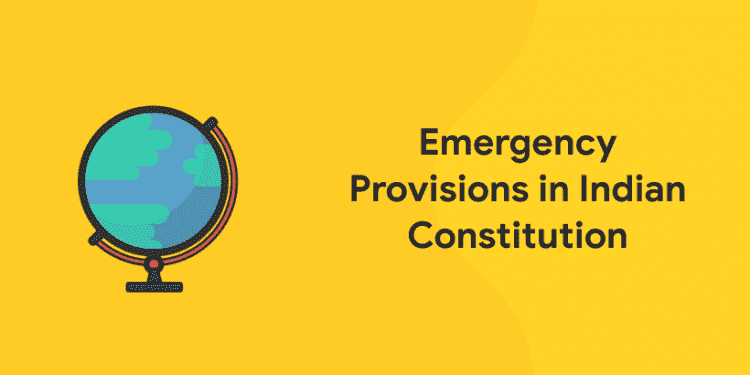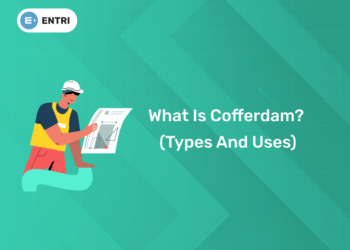Table of Contents
The Indian Constitution is well known for its outstanding features which make it different from the other constitutions. Indian constitution was effective from 26 January 1950. The Indian Constitution entitles the President of the government to proclaim three different emergencies. The National Emergency, Financial Emergency, and State Emergency. In this article, we will discuss the three Emergency Provisions of the Indian Constitution along with a quiz at the end of the session. The Constitution of India states emergency of the below mentioned three types:
- Article 352- National Emergency
- Article 356-Emergency in the state ( president’s rule)
- Article 360- Financial Emergency
Click Here to attempt free mock tests of different Banking Exams!!!
National Emergency
- Under article 352, if the president is convinced that there exists a grave situation, as in the safety of the country is threatened on the grounds of wars, external aggression, or armed rebellion, he can proclaim emergency thereto effect.
- An emergency is often declared over the entire territory of India or any part thereof.
- President can declare an emergency only on the written advice of a body of advisers to a head of state who also serve as the heads of government departments or the cabinet.
- A special group of people is required to approve an emergency decision.
- Once approved, an emergency shall operate for a maximum period of fewer than six months.
- Lok Sabha has the ability to disapprove the operation of national emergency at any time, if not more than 1/10th members of Lok Sabha in writing to the speaker, if a home is in session, or to the president, then speaker or president because the case could also be, shall convene a session of Lok Sabha within 14 days and if such a decision is passed, the president shall abolish national emergency.
Emergency Provisions in the Indian Constitution: Amendments
1: Who was the first woman President of India?
According to the 38th Constitutional Amendment Act 1975 the president can proclaim national emergency on different grounds on the very fact that an emergency is already under operation.
According to the 42nd Constitutional Amendment Act 1976 the following are the changes noted:
- It entitled the president to switch or change a national emergency. Under the earlier constitution the switch or change was not possible , wherein only the imposition or revocations were possible.
- According to the first constitution, the president could impose a national emergency only over the complete territory of India. The 42nd amendment enabled the president to impose the national emergency over an area of the country.
44th Constitutional Amendment 1978: it had been enacted to forestall the misuse of emergency power by the chief.
Click here to attempt static General knowledge quiz!!
Free UPSKILLING Courses!
Take your first step toward mastering in-demand skills, acing interviews, and securing top-tier jobs with Entri's free upskilling courses.
Start Learning!Effects of National Emergency
- On Executive- State governments aren’t dismissed, they still operate, but are brought under the effective control of the center, which assumes the ability to provide instructions to government, which shall abide by such directions.
- On Legislature- State legislatures still operate and legislate, but parliament assumes concurrent legislative power-on state subjects and a law such enacted by parliament, shall cease to work at the expiry of six months after the revocation of national emergency, to the extent of incapacity.
- On Financial relations- President can suspend the distribution of monetary resources between the center and states and the center can make use of any national resource to fight the worth on the thought of which, an emergency is claimed.
- On Fundamental Rights- Article 358 deals with the suspension of the elemental rights guaranteed by Article 19, while Article 359 deals with the suspension of other Fundamental Rights (except those guaranteed by Articles 20 and 21).
- As per Article 358, when a proclamation of national emergency is formed, the six fundamental rights under article 19 are suspended only National Emergency is claimed on the lowest of ware or external offense and not on the grounds of armed rebellion
- Article 359 authorizes the president to suspend the correct to method any court for the enforcement of fundamental rights during a National Emergency aside from article 20 and article 21.
President’s Rule (State Emergency)
- As per Article 355, it shall be the duty of the Union to guard every State against external aggression and internal disturbance and to make sure that the govt of each State is carried on in accordance with the provisions of this Constitution.
- Under article 356, if the president is well pleased on the report of the governor or otherwise that there exists a wonderful emergency where the administration of the state cannot be continued in accordance with the provisions of the constitution, by invoking article 355, an individual can dismiss the government and take over the state administration on to himself and declare that parliament will enact a law on behalf of the state legislature.
Effects of President Rule (State Emergency)
- On Executive- the government is dismissed and therefore the executive power of the state is exercised by the center.
- On Legislature- State legislature doesn’t function to legislate; state legislature is either suspended or dissolved.
- On Financial relation- there’s no impact on the distribution of monetary resources between the centre and therefore the state.
Free UPSKILLING Courses!
Take your first step toward mastering in-demand skills, acing interviews, and securing top-tier jobs with Entri's free upskilling courses.
Start Learning!Emergency Provisions in the Indian Constitution: Amendments
- According to the 42nd Constitution Amendment Act, 1976 extended the amount of state emergency from 6 months to 1 year.
- According to the 44th Constitution Amendment Act, 1978 reverted back the operation of state emergency to six months. Moreover, it divided the utmost period of three years of operation into 1 year under ordinary circumstances and a couple of years under extraordinary circumstances.
Financial Emergency
According to the Article 360- In case the President of India is well pleased that a situation has evolved wherein the financial stability or credit of India or of any area of the territory is threatened, he can by a Proclamation make a declaration there to effect. This emergency was never imposed in India. In they year 1990, the chances of financial emergency came up but the situation was controlled by the Indian Government in July 1991.
Parliamentary approval and duration of financial emergency
- A proclamation declaring financial emergency has to be approved by both the Houses of Parliament.
- The proclamation has to be approved within two months from the date of its issue.
- If the proclamation of Financial Emergency is issued at a time when the Lok Sabha has been dissolved or the dissolution of the Lok Sabha takes place during the period of two months without approving the proclamation, then the proclamation will be enabled until 30 days from the first sitting of the Lok Sabha after its reconstitution, however the Rajya Sabha should in the meantime approve it.
- Once the proclamation of declaration of financial emergency is approved by both the houses of Parliament, the Financial Emergency continues till it is revoked.
Get Free Mock Tests for various Competitive Exams !!!
Emergency Provisions Quiz
1. When was the word “armed rebellion” added to the Constitution of India in order to declare a National Emergency?
a) After 44th Constitution Amendment Act
b) After 42nd Constitution Amendment Act
c) After 40th Constitution Amendment Act
d) After 38th Constitution Amendment Act
Ans. a)
2. On which of the below mentioned aspects can a “Proclamation of Emergency” have its effects?
- Centre-State Relationship
- The life of the Union Parliament and State Legislative Assembly
- Fundamental Rights
a) Only 2 and 3
5. Who among the following has the power to revoke State emergency?
6. Which of the below mentioned was proposed by the Supreme Court in the Bommai Case (1994)?
1) The Centre to prove that relevant reasons to justify the imposition of the President’s Rule.
2) Only after the Parliament has approved the presidential proclamation can the state legislative assembly be dissolved
3) According to the Article 356, A state government pursuing anti-secular politics is liable to action
a) 1, 3
b) 1, 2
c) 2, 3
d) All of the above
7. Which of the below mentioned Fundamental Rights will no get abolished automatically during National Emergency?a) Article 19
b) Article20
c) Article21
d) Both b and c
Ans. d)
8. How long does the national emergency be effective If the announcement of the National Emergency has been approved by both Houses of Parliament.
a) 1 month
b) 2 months
c) 6 months
d) 3 months
Ans: c)
Reasons to subscribe Entri for the preparation of Competitive Examinations
- Entri Provides you an excellent online platform to prepare for the exam
- The Entri app can be download free of cost.
- users can download the app and join the appropriate class as per choice
- Entri provides video classes as well on various important and difficult topics by the excellent faculties in different languages.
- Entri provides revision modules written by excellent faculties. It also provides monthly tests based on the classes
- Entri provides an excellent platform with full- length mock tests. It also provides a platform to solve previous year question papers
- It also gives you access to clarify your doubts whenever required.












